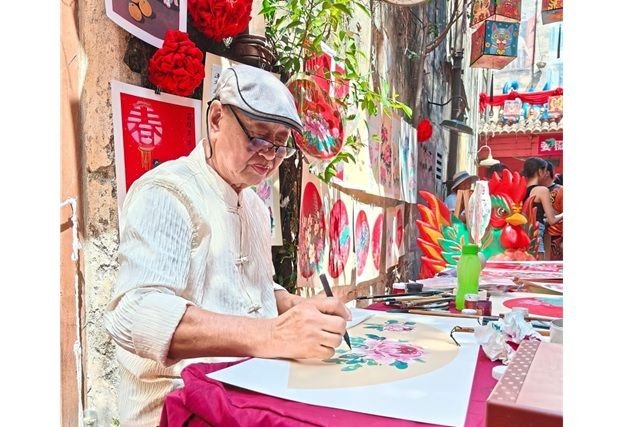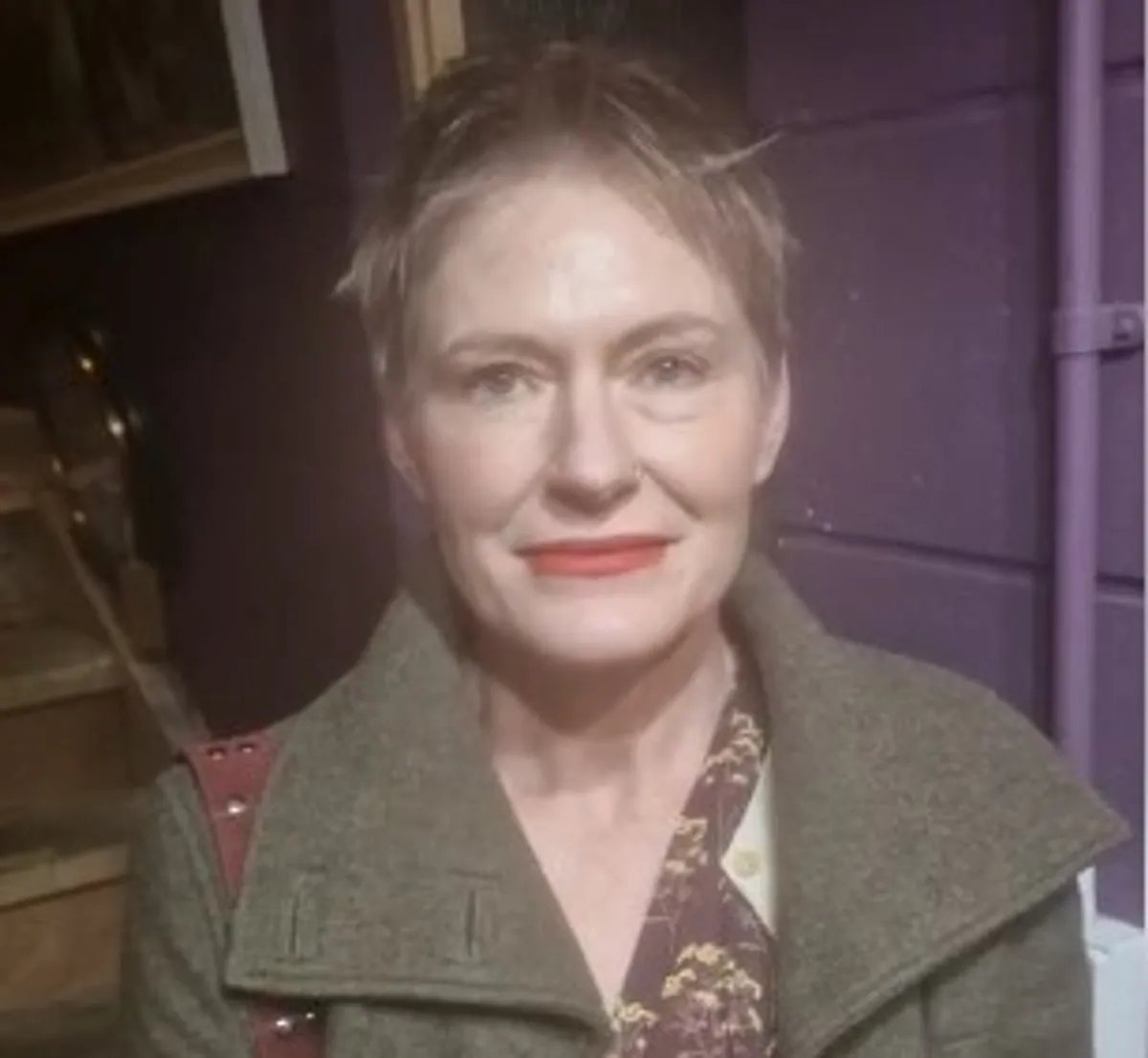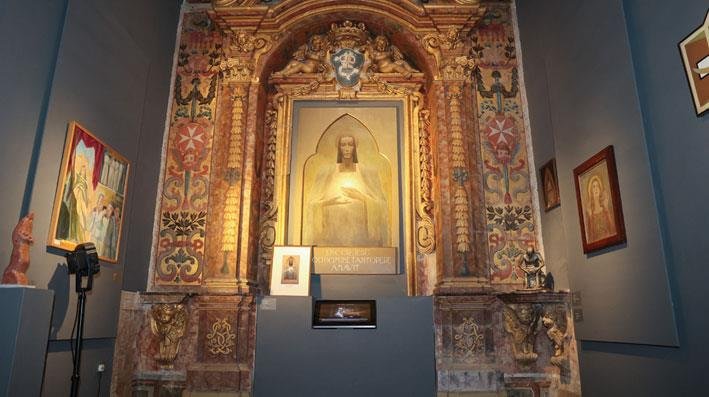An enormous, Alice in Wonderland-sized Purell bottle appears in shattered chards strewn across the floor. The visual is like a cipher in a dream from the most delirious days of 2020. In actuality, the Purell bottle is a sculpture, a ceramic, called Exploded Purell by the artist Susan Chen. It is one of a series of sculptures and paintings by the artist now on view in “Plan B”, Chen’s second solo show at Rachel Uffner (through April 20) in New York. Witty, expressive, tender, and trying—the artworks are a personal look at the upheavals and realities of life over the past few years from the pandemic and the overturning of Roe v. Wade to time spent with friends perusing dating apps.
Chen (b. 1992, Hong Kong) is best known for her thickly impastoed portraits of friends and strangers, portraits often defined by a sense of community and identity. The imagery can call to mind earlier generations of community-minded women artists such as Mimi Gross, Sylvia Sleigh, and even Alice Neel. This exhibition, which is a follow-up to Chen’s debut with Rachel Uffner, “Purell Night and Day” in 2023, includes new portraits alongside new ceramic works, such as Exploded Purell, which Chen is showing for the first time.
Susan Chen, Purell Super Tower (2024). Photo: JSP Art Photography. Courtesy of the artist and Rachel Uffner Gallery.
The exhibition builds off of a momentous few years for the artist. Chen completed her MFA at Columbia University in 2020. That same year, she made her debut New York solo exhibition “On Longing” at Meredith Rosen Gallery. She was also a recipient of the 2020 Hopper Prize Winner. In 2021, her Los Angeles solo exhibition debut opened with “I Am Not A Virus” at Night Gallery, and in 2022 she was named a Forbes Under 30 North America Honoree. In “Plan B” Chen navigates new, compelling, and often thorny subject matter with characteristic humor and compassion.
Those familiar with Chen’s practice will recognize the hand sanitizer imagery. The cleansing gel and its signature corporate branding unified her 2023 show with Rachel Uffner—a symbolic stand-in for anxieties around Covid. In these new works, however, Purell seems to have morphed into an emblem of our cultural fixation with purity and womanhood. In one room of the gallery, enormous Purell bottle sculptures appear on pedestals, intermixed with ceramic Plan B and Tampax boxes (the Tampax sculpture is filled with actual tampons).
Susan Chen, 2024. Photo: Winnie Au.
“I was thinking about how this bottle can be a metaphor for the pursuit of perfection and cleanliness. Women put a lot of pressure on women to become perfect in both a social and personal sense,” Chen said in conversation. In a self-portrait entitled Purell Super Tower, Chen stares out with wide eyes, colorful bottles pile against her forming a kind of dress—reminiscent of a doll stuck in a cake.
“I became obsessed with Purell after the pandemic and also just noticing it’s everywhere, in restaurants, transportation hubs like airports. It’s the new post-pandemic normal,” she said “But about the satire of Purell bottles. It’s supposed to clean you, but never guarantees 100 percent. It can only promise 99 percent. You’re never going to be perfect because it’s not humanly possible.”
Installation view “Susan Chen: Plan B” 2024. Photo: JSP Art Photography. Courtesy the artist and Rachel Uffner Gallery.
Amid personal anxieties, Chen offers grounding moments situated in real-life interaction. In one painting, An Assembly of Aftercare Kits, four women form an assembly line, placing fuzzy socks, Welch’s fruit snacks, stress balls, and menstrual pads into boxes. The painting is based on Chen’s firsthand experience assembling abortion aftercare kits at Planned Parenthood.
“I went with some friends on a Saturday afternoon. It was a bunch of volunteers from New Jersey and New York—people drove in. We put together 4,000 abortion aftercare kits that day. It was really amazing and sad and sweet at the same time,” said Chen, “Some friends suggested I make a painting about it—at first I thought it was too sensitive—but it was an important moment.”
Susan Chen, Purell Bottle (large) (2023). Photo: JSP Art Photography. Courtesy of the artist and Rachel Uffner Gallery.
Community between women—and between creatives—underscores these works. Chen paints each of her portraits, live, in person, during three-hour sessions. Some 39 figures appear in these canvases and the models include both friends and strangers, who responded to social media calls. These sessions become a chance for Chen to listen to people’s stories—and particularly women’s experiences of life today.
Those experiences are captured in “Plan B: A Discussion,” a painting of a diverse group of women around a box of emergency contraception. The women gaze out of the canvas proudly, defiantly. The painting pays homage to Sylvia Sleigh’s famed A.I.R. Group Portrait (1978), in which the members of the all-female cooperative A.I.R. Gallery struck traditionally masculine poses. For Chen, referencing this earlier feminist era was an important gesture.
Susan Chen, Plan B: A Discussion (2024). Photo: JSP Art Photography. Courtesy of the artist and Rachel Uffner Gallery.
“Thinking about Plan B in this exhibition, I was thinking about my own experience taking the pill and the shame and stigma associated with it, and then wondering, why that is. Why does a certain generation of women feel that they can’t talk about this? There’s an uncomfortableness. In making this painting, quite a few women opened up to me about taking the pill but for many, it was the first time. It became a therapy session without me realizing it,” said Chen, “At the same time, Plan B, the morning-after pill, only went onto the market in 1999. It’s only 25 years old. For the generation above, they didn’t even have access to it. They didn’t even have that choice.”
Chen doesn’t think of the works as particularly political—more as moments of lived experience, which, are, in fact, the places the politics unfurl. She decided to offer real tampons in the exhibition as a gesture toward the many women who struggle to afford or access menstrual products. “There are women around the world right now who don’t even have access to tampons. A lot of women have to stay at home when they have their periods because they just don’t have access to these things,” said Chen, “This is my way of imagining a world where period products are free.”
Susan Chen, The Paintings Are Not Going to Paint Themselves (2024). Photo by JSP Art Photography. Courtesy of the artist and Rachel Uffner Gallery.
These embodied realities exist alongside moments with friends and colleagues. In Perils of Modern Dating, a group of young women pull petals off daisies, a winking allusion to romantic trials, while with Silver Art Projects, Chen commemorates her time in residency at the World Trade Center, with a group portrait along with her other resident artists, a painting she describes as a “souvenir of time.”
Perhaps tying these worlds together most succinctly is The Paintings Are Not Going to Paint Themselves, a humorous studio scene that shows Chen hiding under a table in tears, while assistants move vigorously about the studio with brushes and paints around her. Here, Chen playfully does away with the machismo of the artist-genius ideal, instead hinting at the emotional labor given and taken by those around us, and the community necessary to make change—and to make art.
Susan Chen will be in conversation with Karen Wong at Rachel Uffner Gallery on Saturday, April 13, at 2 p.m.
Follow Artnet News on Facebook:
Want to stay ahead of the art world? Subscribe to our newsletter to get the breaking news, eye-opening interviews, and incisive critical takes that drive the conversation forward.






